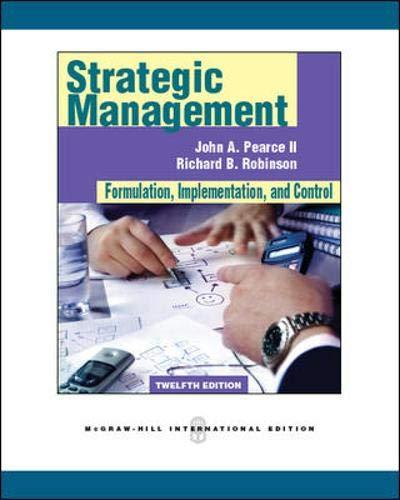Question
subject: general management COMPENSATION/REWARD SYSTEM Case Discussion 12: BP and Royal Dutch Shell Shareholders get upset about high CEO pay when there is a large
subject: general management
COMPENSATION/REWARD SYSTEM
Case Discussion 12: BP and Royal Dutch Shell
Shareholders get upset about high CEO pay when there is a large disconnect between pay and company performance; they are unhappy holding underperforming stocks while executives collect fat paychecks. That was true at British Petroleum (BP), where (in an advisory, non- binding remuneration vote) almost 60 percent of the shareholders rejected the $20 million pay package for CEO Bob Dudley. A similar situation occurred at Royal Dutch Shell, where two shareholder advisory firms urged shareholders to oppose the 2015 pay package of $6.1 million for CEO Ben Van Beuren. While the oil companies are paying generous compensation to executives, they are cutting back elsewhere (e.g., making thousands of layoffs). One estimate put the ratio of CEO pay to average employee pay at these companies at 37 to 1.
The Wall Street Journal reports that oil companies are creating compensation incentives for their executives that are based on the amount of oil found and pumped, compared to the previous year. Thus, the emphasis is on finding and producing more oil (rather than on profitability). One reason for this is that at the time those pay contracts were written, it was expected that oil prices would remain close to (or exceed) the high price of $100 per barrel. Another reason is that finding new oil is important for the ability of these companies to borrow, since banks are being more restrictive with oil company funding.
As oil prices remain below expectations, the wisdom of these incentives is being questioned. Shares of oil companies reached multi-year lows in 2016, with investors in most of the major oil companies taking huge losses due to lower-than-expected crude oil prices. As reported in The Wall Street Journal, Paul Grigel (a Macquarie Group Ltd. Senior analyst who tracks pay- policy changes among energy producers) said, "There needs to be a more returns-focused element in this industry ... This is an issue for a lot of longer-term investors; it's something they're becoming very impassioned about."
A few companies have responded by incorporating capital efficiency, managing debt relative to profits, and cost cutting for calculating the bonuses. Nonetheless, the companies continue supporting the payment of bonuses to their executives even when the investors suffer from lower oil prices. As reported by Reuters, a Shell spokesman supported the company's executive compensation policy stating that it "reflects delivery of our strategy, measured by both short-term and long-term targets. There is a clear alignment between the company's performance and our compensation policies." Similarly, as reported in The Guardian, Ann Dowling, the chair of BP's remuneration committee, defended the level of pay at BP, saying it was "somewhere in the middle" of the industry standard and that "We have to reward people appropriately to attract the talented employees who are important for the future health of the company."
1. What are the advantages and disadvantages of calculating executive bonuses based on the amount of oil found and pumped, compared to the previous year?
2. What are the advantages and disadvantages of calculating bonuses based on alternative measures such as capital efficiency, managing debt relative to profits, and cost cutting?
3. Imposing caps on executive pay in oil companies would prevent executives from walking off with fat paychecks when company performance is low. Evaluate this approach.
4. Review the "Tesla Motors" case discussion. What are the strengths and weaknesses of executive pay plans in oil companies compared to CEO Elon Musk's plan at Tesla?
Note: This case is based on an article by Rakesh Upadhyay in Oilprice.com on May 19, 2016.
Reference: Strategic Compensation and Talent Management: Lessons for Managers by Jed DeVaro (Cambridge University Press, 2020)
Step by Step Solution
There are 3 Steps involved in it
Step: 1

Get Instant Access to Expert-Tailored Solutions
See step-by-step solutions with expert insights and AI powered tools for academic success
Step: 2

Step: 3

Ace Your Homework with AI
Get the answers you need in no time with our AI-driven, step-by-step assistance
Get Started


